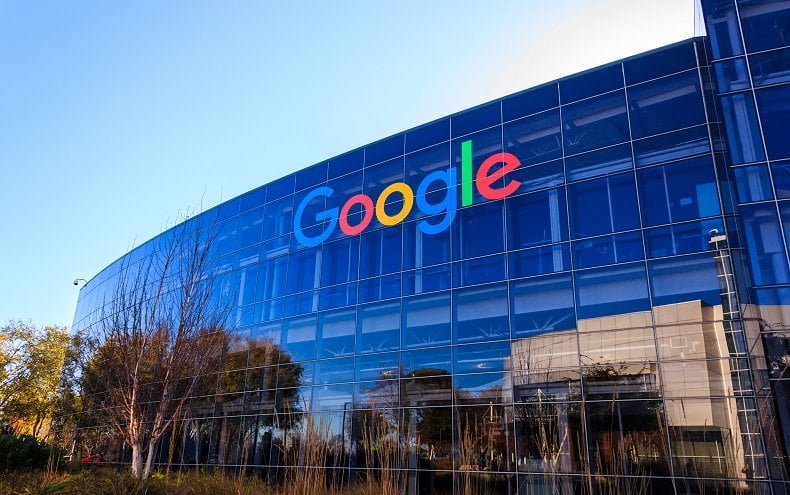In March 2024, Google unleashed a transformative update that sent shockwaves through the online landscape, shaking up countless websites with its algorithmic revisions and even causing some to vanish entirely from Google Search.
The latest core update from Google, rolled out in March 2024, is heralding a new era in the realm of SEO. This significant overhaul is poised to make waves reminiscent of the game-changing Panda and Penguin updates of yesteryear.
The repercussions of this update are staggering, reverberating far and wide across the digital domain. Conversations with seasoned marketers affirm unanimously that this update is not one to be taken lightly. Is your website feeling the impact of the March 2024 core update?
Here are five indispensable insights to steer clear of penalties and safeguard your search ranking integrity in the wake of this monumental shift.
1. Google is completely deindexing websites
Picture the shock of awakening to discover your website banished from Google’s search realm. This was the harsh reality for numerous sites following the March 2024 update’s rollout.
In its March 5 declaration, Google underscored its mission to weed out unhelpful, irrelevant, and uninspired content from search outcomes.
This purge initiative pledges to expunge as much as 40% of subpar websites peddling useless content and delivering dismal user experiences—pages engineered solely to match specific search queries.
Any website caught flouting Google’s protocols or resorting to dubious SEO manoeuvres will not merely face penalties but will face utter expulsion from both search results and the index itself.
In the aftermath of the announcement, the SEO sphere was thrown into disarray, witnessing a seismic shift in its landscape.
Here’s a tweet from Jeff Coyle:
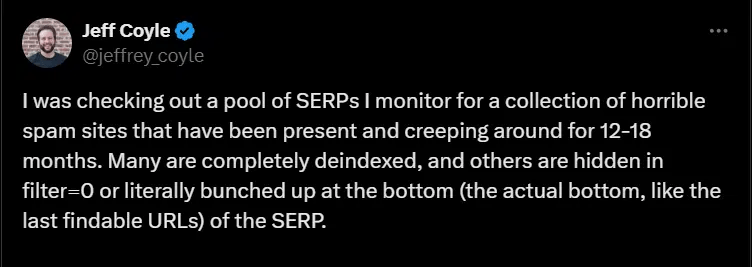
Please keep in mind that totally deindexing websites is often associated with a Google human action rather than a Google core upgrade.
2. Penalties are swift
This upgrade is significant for the severity of the penalties, which left site owners scurrying for solutions.
Let’s look at a staggering ten websites that were deindexed:
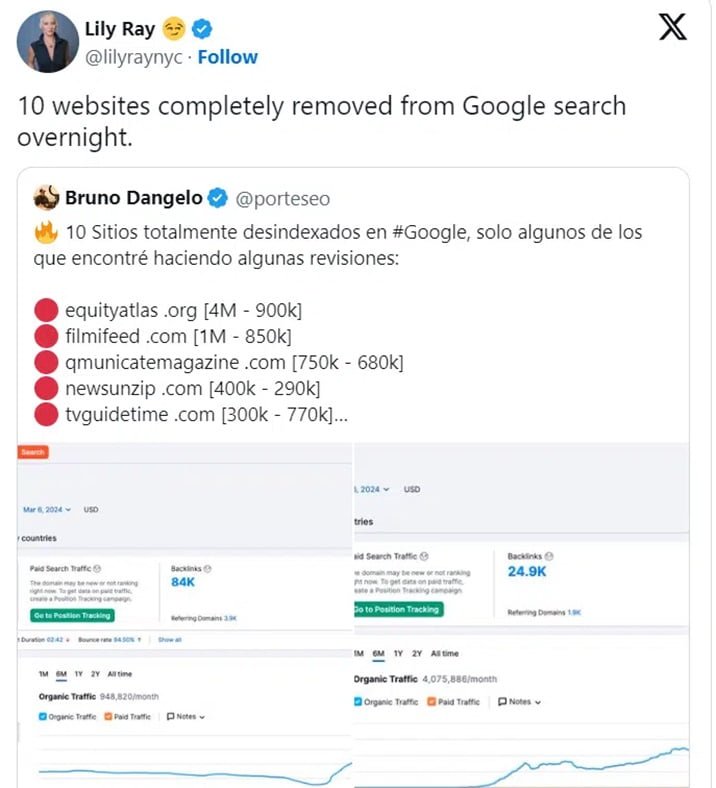
To gauge whether your site fell victim to the Google update, conduct a quick search by typing “site:website.com” into Google and observe if your site appears in the results.
Crucially, it’s worth highlighting that websites hit by the March 2024 core update or spam update won’t receive notifications of a ranking downturn via Google Search Console’s manual action viewer, as highlighted by Barry Schwartz.
“Algorithmic updates operate autonomously, and Google doesn’t notify site owners when their site is adversely (or positively) affected by such updates,” Schwartz notes.
3. Websites that survived previous updates are not immune
Even older websites find themselves in the crosshairs of the latest algorithmic adjustments. Entities previously unscathed by prior updates are now confronting the consequences head-on.
There’s a chorus of voices celebrating this development, asserting that it’s high time these subpar sites were shown the door after exploiting loopholes and clinging onto SERP visibility for far too long.
One such instance is exemplified by the expulsion of this so-called “link building agency”:
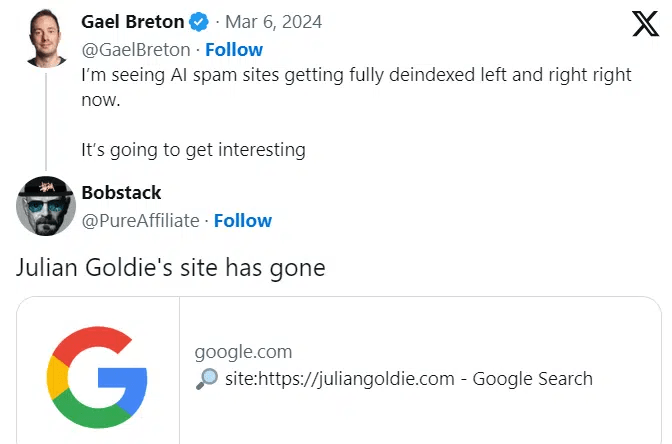
Others are left scratching their brains, wondering why their entire network has gone.
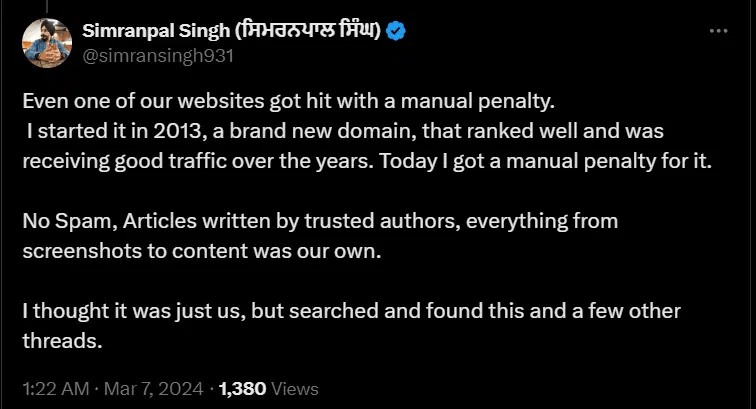
During a conversation within the exclusive Affiliate SEO Mastermind community, a member recounted the distressing tale of a publisher whose entire web of sites collapsed.
As per the discussion, the publisher’s portfolio comprised eight sites, each carving its niche over the past couple of years. The account underscored that the content leaned heavily on human composition, with AI offering minimal assistance.
Presently, all eight domains are experiencing a complete absence of traffic.
This scenario underscores the potential significance of E-E-A-T.
The diverse array of subjects tackled by these sites suggests a dearth of in-depth topical mastery—the kind of expertise and experience that Google holds in high regard when evaluating website rankings.
4. Outdated and error-filled webpages are susceptible
Speaking of E-E-A-T, notice how Google has recently included another element when determining material to be untrustworthy, and with the lowest E-E-A-T:
AI generates content that is obsolete and contains errors.
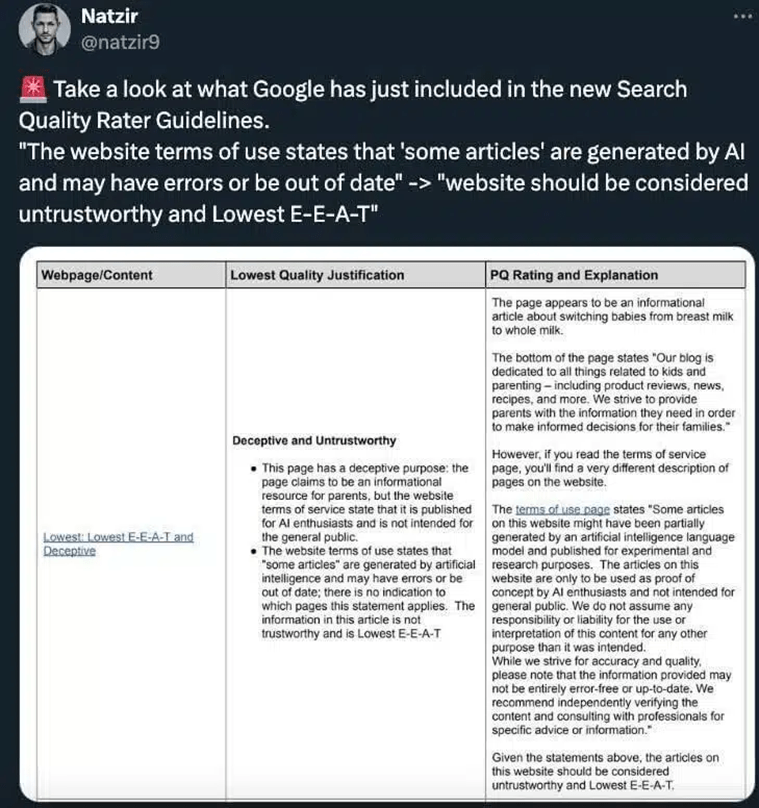
These are guaranteed methods to be de-ranked!
5. Even modest AI content websites were harmed
An intriguing development is that modest AI content sites have come under examination. Google’s capacity to recognise AI-generated material has improved, resulting in penalties for even minor participants in the industry.
Craig Griffiths believes that the regularity with which an AI website generates information is the most telling sign.
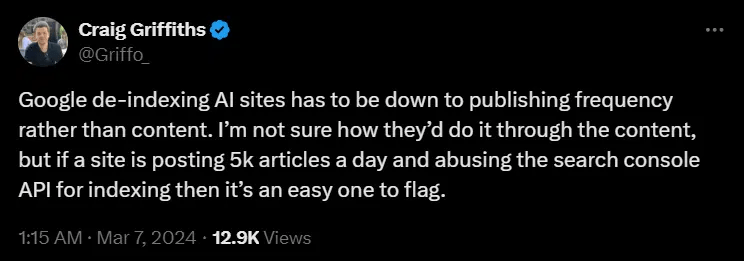
But that is not the case here:
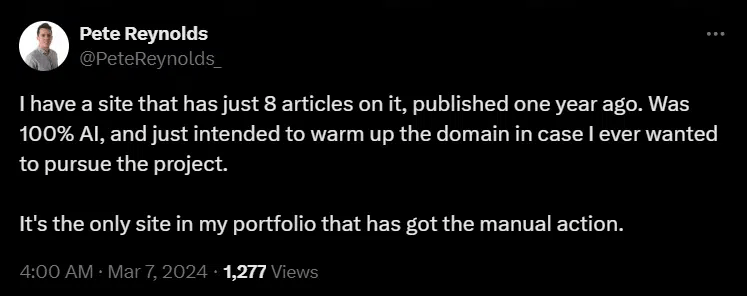
Digging further into the chat provides more particular indications that Google may be searching for:
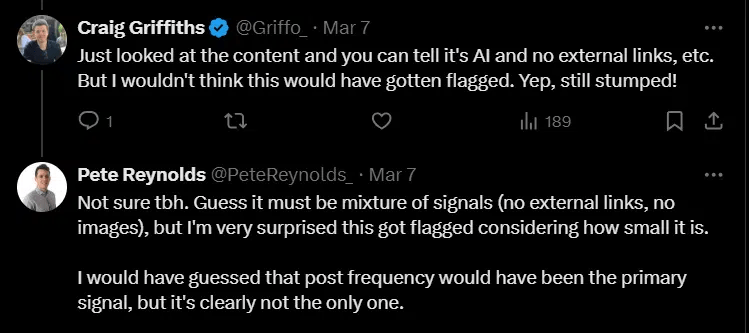
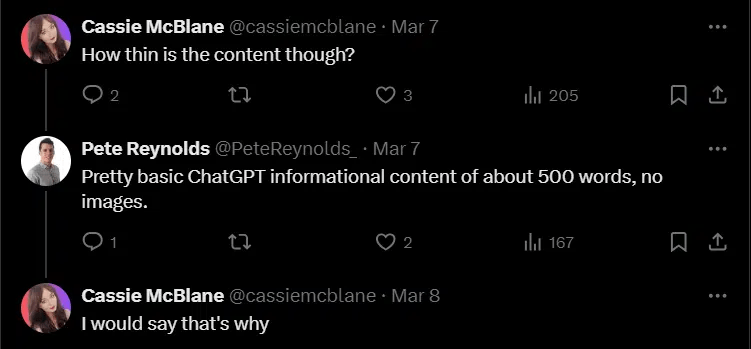
Let’s set the record straight: Google’s target isn’t AI-generated content. What Google is striving for is to purge its search outcomes of redundant, uninspired content—regardless of its source, be it human or AI-generated, or a combination of both.
The most recent update is aimed at eliminating subpar websites that offer no real value to users while elevating those with genuinely beneficial content.
Consider this a wake-up call for website proprietors who presumed their longstanding presence would ensure their safety. It underscores once more that adaptability is the cornerstone of survival in the digital realm.
If you’re at the helm of one of these older, smaller domains, there’s no need to panic just yet. Begin by conducting a thorough site examination and promptly addressing any identified issues.
Key Point: Prioritise quality over quantity
Google has consistently championed originality, depth, and value for readers. Websites that found themselves removed and deindexed often relied on shallow or duplicated content, lacking unique insights or perspectives.
To address this challenge effectively, enhancing E-A-T (expertise, authority, and trustworthiness) becomes imperative. Adhering to E-A-T principles signals to Google—and, importantly, to your audience—that you are a credible authority worth engaging with. This involves citing reputable sources within your field and prominently displaying author expertise on your website.
Furthermore, user experience takes precedence with the latest algorithmic shifts. Your website should not only look appealing but also offer intuitive navigation for visitors. Websites fixated solely on keyword optimisation at the expense of holistic UX design will face penalties.
Prioritising factors like page speed, mobile responsiveness, and clear calls to action enhances user engagement, sending positive signals up the SEO hierarchy.
It’s essential to recognise that by implementing these adjustments, you’re not merely appeasing search engines; you’re fostering a more enriching online environment for all visitors.
Evolve or Get Left Behind
The significant volume of deindexed websites highlighted by the search marketing community underscores Google’s commitment to instigating substantial changes in their ranking algorithms.
It’s wise to analyse the trajectories of websites impacted by algorithmic shifts to identify recurring themes, allowing you to pinpoint your own site’s vulnerabilities and adjust your strategies accordingly.
- Prioritise content excellence.
- Elevate user satisfaction.
- Initiate a thorough site audit and implement the necessary adjustments.
The journey ahead may appear challenging, but remember, each stride towards enhancement distances you further from the perils of Google’s penalties. iCONQUER provide Google friendly, bespoke SEO services which can assist businesses impacted by these updates.
